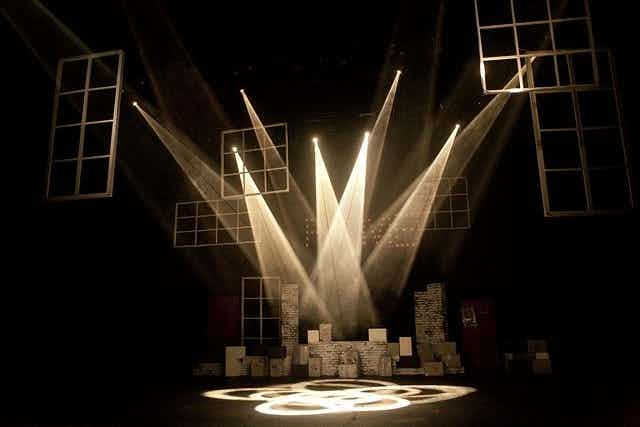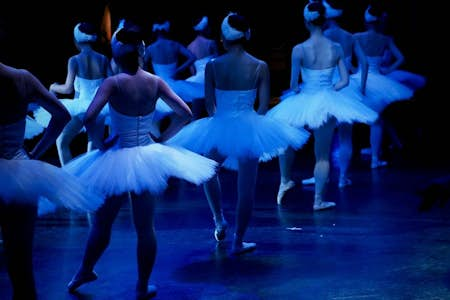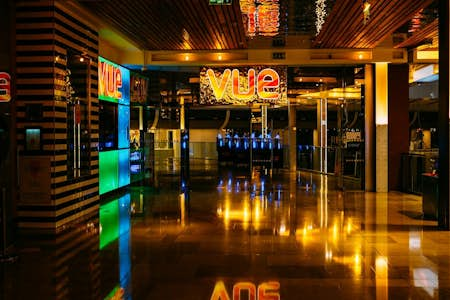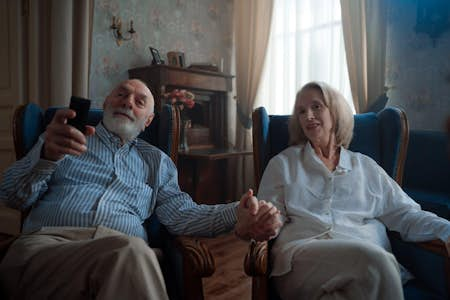Theatre is one of the UK’s greatest exports, and while millions of people across the country are theatre fans, no one knows it all. So, we’ve compiled some of the most interesting and unusual facts about theatre so you can brush up on your knowledge.
1. Shakespeare’s Globe is the only building in London permitted to have a thatched roof
Since the Great Fire of London in 1666, there has been a law banning buildings with thatched rooves because they are such a fire hazard. The Great Fire burned for three nights and destroyed over 13,000 houses in the capital. But don't panic – fire retardants and sprinklers protect the modern thatch used today to ensure we don't repeat history. The Globe actually burned down in 1613, 53 years before the Great Fire. There was only one casualty: a man whose breeches caught fire and were extinguished with a bottle of ale.
2. Saying ‘Macbeth’ in a theatre (unless you’re performing) is bad luck
If you've ever spent time with an actor or theatre maker, you'll know that saying 'Macbeth' in a theatre, unless you're performing or rehearsing the tragedy, is bad luck, as it is believed to be deeply cursed. Instead, actors call it 'The Scottish Play.' According to legend, the actor playing Lady Macbeth in the first-ever performance of the play died suddenly, meaning Shakespeare himself had to play the role. In one performance, a real dagger was used instead of a prop, killing the actor. There were also audience riots at productions in 1721, 1772 and 1849, the latter allegedly leaving 22 dead. Probably best to play it safe and stick to ‘The Scottish Play’ inside theatres.
3. Many actors also believe ghosts haunt their theatres
Another common superstition amongst actors is that ghosts frequent their theatres and performances – and some theatre owners agree. The Palace Theatre in London long kept two seats permanently empty to make room for their resident ghosts. One was believed to be Ivor Novello, the Welsh actor after whom the Novello Theatre is named. The other was said to be an unknown ballerina. However, once Harry Potter and the Cursed Child became such a resounding success, they began selling the tickets for those seats once again.
4. ‘Ghost lights’ are left on all night in many theatres
Whether this is a superstition depends on who you ask. A single bare bulb is left lit on the stage in many London theatres, so it is never completely dark. Some believe that this allows ghosts to perform at night, meaning they will spare the actors and not curse the production. Others say it is merely a health and safety measure to ensure no one falls into the orchestra pit after the company has left. You can choose which one to believe.
5. ‘Off Broadway’ isn’t geographical – it’s strictly based on seat numbers
Many assume the term ‘off-Broadway’ means it is not on the famed Broadway street of New York, but this is not the case. Officially ‘Broadway’ theatres have at least 500 seats. Off-Broadway theatres have between 100 and 499 seats. Off-off-Broadway theatres have fewer than 100 seats.
6. The longest-running theatre production of all time is The Mousetrap
Currently, the longest-running theatre production of all time is Agatha Christie play The Mousetrap. It ran continuously from 1952 and only took its first break in March 2020 due to the Covid-19 pandemic. Its 25,000th performance took place in 2012. Thankfully, it will reopen at St Martin’s Theatre in London later this year. While the show originated in Nottingham and travelled around the UK, it eventually settled in London – first at the Ambassadors Theatre until 1974, then at St Martin’s Theatre.
7. The record for most costume changes in one production is 29
English illusionist Paul Kieve currently holds the Guinness world record for the most costume changes in a single performance. He beat the record at a 2002 production of Our House at Cambridge Theatre. Kieve is also the only illusionist ever to win a New York Drama Desk award. He has helped with illusions and on-stage magic for shows such as Matilda the Musical, Shakespeare’s Arabian Nights and Derren Brown’s West End tour.
8. Bram Stoker worked at the Lyceum Theatre
The Lyceum Theatre, now famous for hosting The Lion King, used to employ Bram Stoker. He worked as the theatre's acting manager from 1878 to 1898 and wrote his famous Gothic horror Dracula during his time there.
9. Disney theme parks are technically considered theatres
Disneyworld, Disneyland and the countless other Disney-owned theme parks are actually considered to be large-scale theatres. Employees at the parks are called 'Cast Members,' and Walt Disney World in Florida holds the record for the most costumes, with 1.2 million in its wardrobes.
10. You can rent your favourite National Theatre costumes
National Theatre is one of the most prolific theatre companies in the UK, boasting recent cast members such as Ralph Fiennes, Andrew Scott and Billie Piper. Their costume and props department stores between 80,000 and 85,000 costumes from various productions worn on its coveted stage, all of which are available for hire by the public.
11. Les Misérables is the longest-running musical and has a record number of costumes
While The Mousetrap is the longest-running play in London, the longest-running musical is Les Misérables, which has been performed over 13,000 times. Each performance of the Victor Hugo play uses 392 costumes, including 5,000 separate items of clothing and 85 wigs. It is also one of the most notable uses of a revolving stage, totalling 63 rotations per performance.
12. The most expensive theatre tickets are over $1,000 per seat
The smash-hit musical Hamilton broke Broadway's record for the most expensive theatre ticket in 2017, charging $1,150 per ticket. The premium-priced ticket was the best in the house during the week between Christmas and New Year's Day. It was the first time a theatre ticket had ever hit quadruple digits, with the previous record held by Hello, Dolly, which sold front row seats for $998.
13. It’s bad luck to whistle on stage
While this is another renowned stage superstition, there was an actual reason for this one’s inception. In early theatre, sailors used to be regularly hired to work in the theatres as riggers, stagehands and costumers. Their unique skills with knots, ropes and sewing made them highly sought after. So backstage – before headsets were used – stagehands used whistle commands that originated on ships to communicate. So actors whistling on stage could accidentally cause a premature curtain call, a backdrop being rolled out onto someone, or a prop being thrown in at the wrong time. We don’t use whistle cues any more – but the superstition has stood the test of time.
14. The Dominion Theatre stands at the site of the Great Beer Flood
One of the lesser-known historical events of 1814 was the Great Beer Flood, which occurred precisely where the West End’s Dominion Theatre now stands. The flood started at the Horse Shoe Brewery, which burst open and spilt over 570 tons of beer into St Giles and Tottenham Court Road. The tragedy took eight victims. Rumours say it wasn't just the flood that killed them, but that the flocks of people running to get the free beer were also responsible!
15. Shakespeare invented over 1,700 modern words
Shakespeare’s plays will go down in history as some of the most masterful works ever written. Still, many don't know that he created many of the words himself. A mixture of portmanteaus and switching nouns to verbs or vice versa gave us many words we still use today. These include bubble, assassin, advertising, exposure, and hobnob.
16. Harry Potter and the Cursed Child holds the record for the most Olivier Awards
The coveted Laurence Olivier Awards are distributed every year by the Society of London Theatre to recognise outstanding productions. In 2017, Harry Potter and the Cursed Child took the crown as the most awarded play since the awards' inception in 1976, 8 years before Olivier's death. The show was nominated for 11 awards and won nine of them, including Best New Play. The musicals with the most Olivier awards are Hamilton and Matilda the Musical, which are tied with seven awards each.
17. Bob Fosse won a Tony, an Oscar and an Emmy in the same year
American choreographer and dancer Bob Fosse was the first person to win a Tony, an Oscar and an Emmy Award in one year. He won the Academy Award for Best Director for Cabaret, the Tonies for musical direction and choreography for Pippin, and three Primetime Emmy Awards for outstanding music, directing and choreography for Liza with a Z. Who took home all of the awards in 1973.
18. Only 16 people have ever achieved an EGOT
The coveted EGOT is an acronym for Emmy, Grammy, Oscar and Tony Awards. Many in the theatre and film industries shoot for this grand-slam title. The awards recognise achievements in television, recording, film and theatre. There are only 16 people who have won all four awards in their lifetimes, with notable honourees including Audrey Hepburn, Whoopi Goldberg, Andrew Lloyd Webber, Mel Brooks and John Legend. Only one person has ever won a Double EGOT – winning all four awards at least twice – which was songwriter Robert Lopez. He is also the youngest EGOT winner, at just 39 years old. He has won for his music in blockbusters including Frozen, The Book of Mormon and Avenue Q.
19. The shortest show run in history closed before the end of its first performance
The shortest running show in history was The Intimate Review, performed at the Duchess Theatre in 1930. It didn't even make it through the whole play. According to critics, the stage was cluttered with props, meaning scene changes took 20 minutes each. The backdrop was so thin you could see stagehands arguing behind it. The producers edited the play to remove several of the scenes on the fly before two actors getting their costumes entangled brought the performance to a close. They promised to reopen later that year, but they never did.
20. The most successful film based on a play was Grease
There have been countless plays adapted into feature films over the years, but some are, of course, more successful than others. The top-grossing movie based on a play is the 1978 smash hit Grease, which grossed over $180 million. However, if you adjust the films for inflation, you get a different story. Allowing for inflation, the top-grossing movie would actually be The Sound of Music from 1965. In these rankings, Grease takes third place after My Fair Lady.
21. The Lion King is the highest-grossing Broadway musical of all time
The Lion King is the best-selling theatre production of all time on New York’s Broadway. Still running today, it has grossed over $1.6 billion since it opened in 1997. It is followed by Wicked, which opened in 2003 and has grossed $1.37 billion, and The Phantom of the Opera, which opened in 1988 and has grossed $1.25 billion. The newest play to reach the top ten is – of course – Hamilton, which opened in 2015 and has grossed nearly $650 million.








